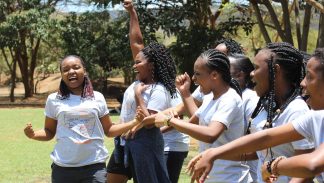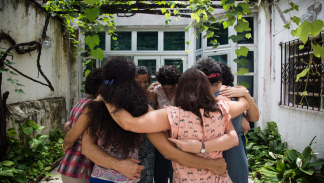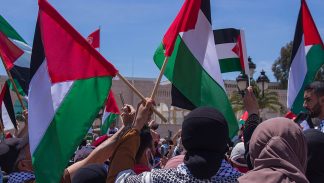Syria attack: A critical moment for global action, six years too late
More than 100 people, including women and children, are believed to have been killed and hundreds more injured in a chemical attack in Syria on Tuesday. Syrian doctors and other officials believe the odorless and colorless chemical agent sarin—which Damascus was supposed to have gotten rid of as part of a 2013 U.S.-Russian-brokered deal—was used in the attack on the town of Khan Sheikhoun in northern Syria. If confirmed, the incident would be the deadliest chemical attack in Syria since sarin gas killed hundreds of civilians in Ghouta near Damascus in August 2013, according to Reuters.
While the Syrian government has denied responsibility, officials around the world blame Assad’s regime for this war crime targeting innocent civilians, and bombing clinics treating the survivors. The UN Security Council went into emergency talks Wednesday to determine collective action to end the devastating six-year Syrian civil war.
More than 14,000 people have been subjected to chemical weapons attacks since the beginning of Syria’s conflict in 2011, and more than 1,500 have died as a result, according to research by the Syrian American Medical Society.
This gross violation of human rights and disturbing use of chemical weapons must be condemned, and the perpetrators held accountable. The international community must not stand by while Syrians are killed, injured, targeted, and forced to flee their homes. We must take meaningful action.
Speak out against this attack and the ongoing war in Syria. Demand that your government holds Syria’s leadership accountable and commits to swift and decisive action to help end the war. Remind countries around the world to open their borders in light of the resulting refugee crisis. Commit to helping Syrian refugees around the world.
At Global Fund for Women, we know that women and girls in Syria have been acutely impacted by the conflict and exposed to a wide range of violations. Many have been raped, physically and sexually abused, harassed, and tortured. Others have been arbitrarily arrested and detained. For many of those who left Syria and sought asylum in neighboring countries, the violence did not stop when they became refugees. In addition to the physical and psychological trauma and exploitation that resulted from the conflict they fled, Syrian women and girls refugees are subjected to threats and violence both inside and outside refugee camps. The precariousness of their situation as asylum seekers makes them especially vulnerable to human rights abuses.
While providing basic services is undeniably important, what is often missing from international aid is any intervention that will build women’s leadership, agency, or human rights. Global Fund for Women believes such work is vital—not only for empowering women, but for influencing national and regional political and peace-building efforts.
We are focused on building the efforts of our partners—established and dynamic women’s rights organizations in Lebanon, Turkey, Iraq, and Jordan—to address the unique needs of women and children, and build the leadership and voice of Syrian women and girls.
Our grantee partners will not only provide essential services to Syrian women and girls, but also offer training in women’s rights, ending violence, psychosocial rehabilitation, legal counseling, and programs including vocational, language, and computer trainings. It is comprehensive support like this that will empower Syrian women and girls to be agents of change within camps or other settlements, and ultimately to position themselves to advocate for their rights in national and international settings.
We’re working with women’s groups like Tadamon [Arabic for “Solidarity”], which is empowering women in the overcrowded Shatila camp in southern Beirut with critical access to healthcare, workshops about ending violence, and skills trainings to start their own businesses.
Khalidat Hussein, who leads the work of Tadamon and is a Global Fund for Women advisor, described the immediate needs of Syrian women refugees in Lebanon, saying: “They need rest. They need education for their children. They need awareness, and preventive and reproductive health. They need to know their rights and they need some kind of economic support, like vocational training. They need legal aid.”
Tadamon and other Global Fund for Women grantee partners work with Syrian women like Hadija, a 36-year-old refugee from Deir ez-Zor, Syria, who now lives in Shatila with her family. Here is Hadija’s story, as told to Global Fund for Women through a translator:
“We can’t find any place better than Syria. Syria is our country, our mother. Syria held us close. We lived in dignity.” Hadija has been living in Shatila a year and a half with her husband and five daughters. Through tears, she explains that she used to have six, but her daughter was killed in the war in Syria when she was five years old.
“Our village, Deir ez-Zor, is now under the hands of ISIS. Life is like a prison.” She and her family escaped as ISIS was entering the village. They moved around within Syria and slept in abandoned public schools to hide from bombings, then spent two days at the border before crossing into Lebanon.
They came to Shatila because they heard rent in Palestinian camps was cheaper. Their rent is the equivalent of $330 per month and they’re having trouble paying it. The UN Refugee Agency gives them $66 per month for food, medicine, rent. “My husband has a handicap and cannot work; he needs surgery and we cannot afford it.”
She explains how different her life was before the war, living in Deir ez-Zor. “It was a very safe and happy life. We spent free time with friends, drinking cola, and eating nuts. Our kids could come and go without any worry…Our girls used to go to school in Damascus and no one said anything.” They planted their garden and grew their own food, fresh vegetables and fruits, which they sold in their own small supermarket in Syria.
For Hadija, since starting to attend workshops and trainings led by Tadamon, which she found out about through a neighbor, she is feeling better about her life in Shatila—and her daughters’ future. Her girls are only attending the school run by Tadamon because the Lebanese school is too far to send the girls. “Who will accompany them every day?” Hadija asks, rhetorically, noting that there is no transportation even though the schools are opened to Syrian children and it is extremely unsafe for the girls to walk there alone.
Hadija says that her daughters became more social and happier since starting at Tadamon. She says they couldn’t use a pencil, and now they can, and that they’re excited about books and reading. “They used to cry, be shy, unsociable, but now they’re more happy and good in expressing what they learn.”
With Tadamon’s skills trainings, Hadija has started her own business in Shatila selling hair clips that women wear under their scarves and hair ties. Because of this, Hadija is now able to pay her family’s rent. “I’m sewing decorative hair ties and selling them to pay rent.”
Now is the time to build on the efforts of our partners in Lebanon, Iraq, Turkey, and Jordan to address the unique needs of Syrian women and girls, and equip them with the skills and trainings to earn incomes, speak out about women’s rights, and become leaders in their communities. Let’s empower Syrian women and girls to realize their full potential, and live the futures they want and deserve.
Photo credit: Hadija with two of her children in their home in Shatila camp. Alissa Everett for Global Fund for Women.
Demand peace and justice for Syrian women
Now is the time to deepen our commitment to helping Syrian refugees around the world. Take action to support our resilient grantee partners working to address the unique needs of women and girl refugees in the Middle East. Let’s empower Syrian women and girls to realize their full potential, and amplify their leadership and voice. The future of Syria depends on it.
We can’t find any place better than Syria. Syria is our country, our mother. Syria held us close. We lived in dignity. Our village, Deir ez-Zor, is now under the hands of ISIS. Life is like a prison."Hadija, a Syrian refugee living in Shatila camp in Beirut, Lebanon


